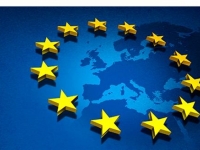Politics
EUROPOL launches international police operation Ciconia Alba 2016
To combat organised crime
All this are the Member States of the European Union; the EU Agencies CEPOL, EFE, the European Commission, EMCDDA, Eurojust, Frontex and TISPOL; a number of non-EU countries such as Colombia, Norway, Switzerland and Turkey, and such organisations as the US ATF and DEA, INTERPOL and the Centre for Maritime Operations and Analysis. Over the next few months, this operation will implement a series of actions to combat the organised crime groups involved in certain specific fields of criminal activity, such as people trafficking, illegal immigration networks, forgery, public treasury fraud, drug trafficking (synthetic drugs, cocaine and heroin) illegal arms trafficking and cybercrime.
Following the success of the operations 'Archimedes' in 2014 and 'Blue Amber' in 2015, operation 'Ciconia Alba' in 2016 is the third major operation forming part of the so-called "Joint Action Days" (JAD) within the framework of the EU Political Cycle 2013-2017 aimed at combating international organised crime. On this occasion, operation 'Ciconia Alba' will not only focus on the main criminal areas and infrastructures in the European Union but will also look further afield.
To do so and in collaboration with other international agencies, liaison officers from the Member States of the European Union will coordinate the exchange of information and intelligence between the national authorities responsible for their police forces from a permanent coordination centre located at EUROPOL Headquarters in The Hague (Netherlands), which will operate 24 hours a day, seven days a week, alongside EUROPOL specialists and analysts who will provide support from EUROPOL Headquarters itself and on the ground.
It should be noted that operation 'Ciconia Alba' has already obtained its first results in the field of international crime. Within the framework of the priorities of the EU Political Cycle aimed at "People Trafficking" and the "Fight against Illegal Immigration Networks", the State law enforcement agencies involved in this operation recently carried out a Joint Action Day (JAD) to counter groups engaged in people trafficking for forced labour purposes. As a result of this Joint Action Day, 47 people were arrested and 275 victims of forced labour were identified and released.
During this joint operation, a total of 6,709 people, 4,156 vehicles and 2,271 companies were searched at various key geographic locations, such as airports, border crossings, etc. where the chance of identifying potential victims of people trafficking, as well as to arrest people traffickers and illegal immigrants, were high. Furthermore, State law enforcement agencies around the world arrested 140 people on charges of fraud with plane tickets bought with stolen or falsified credit cards, some of whom were also involved in other offences relating to people trafficking, drug trafficking, cybercrime and terrorism. A total of 252 suspicious transactions were identified during this operation.
The multidisciplinary approach adopted in this operation enabled police forces to undertake actions covering various priority areas and fields of criminal activity. This approach improves the operational impact and ensures cost/effectiveness cooperation between the State law enforcement agencies involved in these operations. The Standing Committee on Operational Cooperation on Internal Security (COSI) of the Council of the European Union has produced strategic guidelines for planning Joint Action Days and oversees their application.
The role of Spain
Spain plays an important role in this EU Political Cycle 2014-2017 in the fight against organised crime, providing active involvement and a significant presence. Experts from the Spanish National Police Force, Guardia Civil and Customs Agency regularly take part in the Operational Action Plans drawn up against the various criminal activities targeted by the EMPACT projects, with Spain providing significant leadership in the priorities of firearms and cocaine. Led by Spain, numerous operational, strategic and training activities have been developed over the last two years and a half under the Political Cycle both in Spain and overseas.
These include Operation Elektra, in which 402 kilos of cocaine were seized at the Port of Valencia arriving from Ecuador, various operations against arms trafficking developed in Spain in recent years, as well as the 'Balkan Trigger' Joint Action Days organised by INTERPOL and involving EMPACT Firearms, with over 5,000 police officers deployed at the borders of Bosnia-Herzegovina, Croatia, the Republic of Macedonia, Montenegro, Serbia and Slovenia during which over 40 firearms, 6 kilos of explosive, 11 hand grenades, 1,300 ammunitions clips, 14.5 kilos of gold and 250,000 euros in cash were seized.
Further examples can be found in the results obtained from the previous JAD (Operation Archimedes in 2014 and Operation Blue Amber in 2015). Many of these operations were undertaken with support from European funds. All these activities are integrated and coordinated by the National EMPACT Coordinator, a task in Spain that falls on the Director of the Intelligence Centre for Counter-Terrorism and Organised Crime (CITCO), Jose Luis Olivera, in close collaboration with the Support Groups set up within the Spanish National Police Force, Guardia Civil and Customs Agency.
It is also worth highlighting the support provided by the Latin American and International Foundation for Public Policies and Administration (Spanish acronym: FIIAPP) as the body that manages EU funds in Spain for undertaking various activities within the framework of the EMPACT projects. Strategic management is provided by the Standing Committee on Operational Cooperation on Internal Security (COSI), the meetings of which are attended by representatives from the State Secretariat of Security.
Liability for this article lies with the author, who also holds the copyright. Editorial content from USPA may be quoted on other websites as long as the quote comprises no more than 5% of the entire text, is marked as such and the source is named (via hyperlink).






